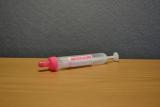Test Directory
NPM1
Containers - Adult

Red Cap Tube EDTA KE 9ml
|
Volume Range
2 x 9ml peripheral blood, bone marrow specimen or FFPE tissue. Total volume required is 10-15mL. Sample tube can be any size as long as it is EDTA anti-coagulated.
Additive per Container
EDTA |
Laboratory Site
Edinburgh
EH4 2XU
Transport arrangements
Specimens should ideally arrive within 24 hours of collection (maximum of 48 hours) and should be sent to the following address:
Western General Hospital
Haematology/Biochemistry Combined Reception
Immunophenotyping Laboratory
Crewe Road
Edinburgh
EH4 2XU
See also Specimen transportation.
Sample storage arrangements
Samples should be stored at room temperature. See specimen requirements.
How to request
Please refer to our detailed requesting instructions. The HMDS request form can be located here.
Availability
Monday-Friday 9am-5pm
Anticipated turnaround
Results should be expected within 3 working days. See results.
Static information/disclaimer
Identification of the presence of an NPM1 mutation is accredited to ISO15189.
Characterisation of the NPM1 mutation by Sanger sequencing is accredited to ISO15189. However, part of this procedure now makes use of an automated pipetting system which has been separately validated but is not currently accredited to ISO 15189.
General additional information
NPM1 gene mutation analysis performed for all patients diagnosed with AML based on immunophenotyping results via a reflex testing strategy.
Mutation in the NPM1 gene is observed in approximately 30% of AML cases and is frequently associated with a normal karyotype. The presence of an NPM1 mutation in the absence of a FLT3 internal tandem duplication is associated with a more favourable prognosis in AML.
FLT3 (ITD and D835) mutation detection is also available for AML patients at diagnosis.
For patients carrying an NPM1 mutation for whom molecular monitoring will be required, identification of the mutation type will be determined by next generation sequencing or Sanger sequencing.
Molecular monitoring for NPM1 positive AML is available for types A, B & D.
For NPM1 MRD monitoring, refer to the separate entry in the test directory, found here.
For clinical advice on appropriate investigations and advice for the interpretation of test results, please contact us.